- Home
- Troy Denning
Shadows of Reach: A Master Chief Story Page 17
Shadows of Reach: A Master Chief Story Read online
Page 17
She blinked at the display a few times, issuing ocular commands, then studied the screen for a few moments. “It says you were wounded a day ago. Is that right?”
The precise date and time of the injury appeared on John’s HUD. “Just over, ma’am.”
Her eyebrows rose. “Then you have remarkable healing powers.” She slipped the medical pad back into her apron pocket. “It appears a large chunk of your quadriceps was burned away when the plasma bolt impacted, but your functionality records and metabolic panels are already at the levels I’d expect to see after ten days of bed rest. Is that due to your augmentations?”
“I couldn’t say,” John replied, silently adding: Because it’s still classified. For much of its existence, the SPARTAN-II program had been a secret so tightly held that even most UNSC personnel weren’t aware of its existence. That had changed late in the Covenant War, when someone far above John’s pay grade realized people needed a reason to believe that humanity could prevail against the implacable aliens. But the specifics of the Spartans’ training, equipment, and especially their biological augmentations remained highly restricted. “What augmentations would those be?”
“The ones that prevented your femur from breaking when you had that hole blown in your armor,” Somogy replied. “I’ve treated a lot of combat injuries since the Banished arrived, so I know what happens to a human body when it takes a bolt from a Banshee’s plasma cannon.”
“It’s great armor, ma’am.” John tapped his right thigh. “Titanium shell. Energy shield.”
“Sure—it’s the armor. Look… just stay off the leg for a couple of days and remove that thigh plate—”
“Cuisse.”
“Whatever,” Somogy said. “Just take it easy for a couple of days, and you’ll be fine.”
“Define easy.”
“No running, no jumping. No forced marches. No combat. You know—rest.”
“Thanks for the suggestion.”
“You’re not going to take it, are you?”
“I can’t,” John said. “We have a mission.”
“Then why bother me? I have patients who actually need my services, you know.”
“Colonel Boldisar insisted,” John said, “and it seemed easier not to argue. I know rear admirals who aren’t that stubborn.”
“I’m not surprised,” Somogy said. “Sasa Boldisar is the founding director of the Eposz Reclamation Collective.”
This revelation wasn’t wholly unexpected. After loading the three Spartans onto the wagon in the Juh Mező Aqueduct, the colonel had sent Istvan Erdei to tell John that he would receive the debriefing he’d requested when they reached Logistics Base Gödöllő. When John asked how long the trip would take, Erdei had simply responded that it didn’t matter, because Sasa wanted him there. Had John realized the journey would be a twenty-five-hour wagon-ride through an abandoned aqueduct, he might have resisted the invitation.
Which would have been a mistake. The long ride had rendered his Mjolnir’s inertial navigation nearly useless. But he had paid careful attention to the light glowing through the lechatelierite overhead and determined that they were traveling generally westward, toward the Highland Mountains—and their mission objective in CASTLE Base.
And they were doing it all underglass and unobserved.
John had lost contact with Linda and Special Crew, and he hadn’t wanted to compromise their security by asking the militia about them. He could only hope they had stumbled onto the underglass network of passages themselves when they took cover under the riverbed, and were even now using it to continue moving the excavation machines toward CASTLE Base as ordered.
When John remained silent, Dr. Somogy continued her explanation. “That also makes her the commander in chief of the Viery Militia.”
“So, what Sasa wants…”
“Yes… Sasa gets.” Somogy flashed a commiserative smile, then added, “But I wouldn’t want to seem ungrateful. Sasa has more at stake here than any of us.”
“And that qualifies her to be commander in chief?” John asked.
“That, and her organizational skills,” Somogy said. “Don’t you know who Sasa Boldisar is?”
John queried his onboard computer and got nothing. “No idea.”
“She’s the founder of Kerepes Agricultural. Her great-great-grandfather was Ferenc Kisvárda.”
John didn’t need his computer to identify either of those names. Before the fall of Reach, Kerepes Agricultural had grown into a major food supplier to the UNSC—he had seen their crossed wheat-stalks logo on thousands of supply crates and self-cooking meal canisters. And while Kisvárda Metals had started on Reach mining titanium and rhodium, it had grown into one of the largest mining and metals production conglomerates in the Inner Colonies.
“Okay, she has resources and knows how to get a job done,” John said. “But why this job? She could live on any planet she wants.”
Somogy shrugged. “It’s a matter of gratitude. Reach has blessed her family with so much, she says she couldn’t live with herself if she didn’t restore it.”
“You buy that?”
“I don’t not buy it,” Somogy said. “We all have our own reasons for returning to Reach. Istvan Erdei says it’s the one place in the colonies where a man doesn’t need a piece of paper to prove he’s useful. Rendor Borbély claims it’s because he and his family won’t join their ancestors in the afterlife if they’re buried on a different world. I’m here because these are my people, and there weren’t a lot of doctors volunteering to come back with them. I doubt any of us really understand why the others are here—and I don’t see that it matters. We’re here now, and there is no leaving… at least not until you’ve driven these aliens away.”
John couldn’t tell her the truth, and he didn’t want to lie. So he said nothing.
But Somogy wasn’t about to let him off that easy. “That is why you’re here?” she asked. “Is it not?”
John tipped his faceplate down, so she would know he was looking her in the eye. “Sorry, ma’am, I can’t tell you that. Our mission is classified.”
Somogy’s expression floated for a moment between disappointed and confused, then she finally gave her head a little shake and said, “Well, as I say, we all have our own reasons for being here. It only matters that you are.” She tapped his damaged cuisse. “You have my recommendation, Master Chief. If you don’t follow it, there will be problems with scar tissue.”
“Scar tissue, I know about.”
“I imagine you do.” She folded her arms. “So… is there anything I can actually do for you here?”
John glanced at the holographic locket hanging from her neck, but couldn’t bring himself to ask—even when she seemed to sense where his gaze was directed, despite the mirrored faceplate, and unconsciously put a finger to the images.
“Yes, ma’am. First, can you tell me the status of Spartan-087 and -104?”
Somogy hesitated, no doubt weighing medical privacy concerns, which simply did not exist for Spartans.
“Normally I’d just tap into their BIOS,” John said. “But the datalink is blocked.”
Somogy nodded. She drew the medical pad from her pocket again and flicked her eyes at the screen.
“Um, Frederic-104 was willing to remove his helmet, so they’re giving him a handheld CT to confirm the absence of intracranial hemorrhaging. But I wouldn’t expect any. His TBI is rated at mild.” She paused to look up at John, then added, “That’s rather remarkable, given the dent in his helmet.”
“Fred has a hard head. It’s one of his best assets.”
“Apparently so.” Somogy returned to the screen. “Kelly-087’s axillary vein was obstructed by the emergency biofoam repair. She wouldn’t remove her armor either, so Dr. Kelemen used a vascular scope to go through the breach and do a revision. I’d say she’ll be fine in a week, but—”
“We don’t have a week,” John said. “What’s realistic?”
Somogy considered, then said, “I
f she heals as fast as you do, the risk of a catastrophic bleed should be minimal by tomorrow.”
“I’ll keep that in mind, ma’am. Thanks for being clear.”
“My pleasure,” she said. “And?”
“Ma’am?”
“You said first. That implies you wanted something else.”
“Right.” John took a deep breath, then pointed at her locket. “Your two boys, are they…?”
The smile that spread across her face told him the boys were alive. “Laszlo and Vidor.” She indicated first a blade-nosed youth who looked a little older, then his slim-faced brother. “They’re in the Drifts with their father.”
“The Drifts?”
“The Gönc Drifts—a network of old mining tunnels in the Lébény district,” Somogy said. “They’ll be thrilled to hear that I consulted for the Master Chief.”
“It might be better if you didn’t mention it, ma’am. Our presence on Reach is classified.”
Somogy laughed. “Well, good luck with that. You’ve been the talk of the base since Istvan had to call off his operation.”
“We have?”
“Yes, you have,” Somogy said. “People are pretty excited.”
John didn’t bother asking why. He could guess.
Instead he asked, “The Lébény district—isn’t that in the Highland Mountains?”
“It is,” Somogy said. “Do you know where the Scheelite Workings are?”
John didn’t, but he knew that scheelite was an important tungsten ore, and there had once been a lot of tungsten mines near CASTLE Base, to the north of the Military Wilderness Training Preserve.
“Somewhere near Gönc, I assume.”
“That’s right. Above the old town, in Gönc Canyon. We’re using the old mines as a training reservation.”
“How so?”
Somogy frowned. “Well, we’d have been pretty foolish to wait for the UNSC to show up to help us out right now, wouldn’t we?”
“Yes, ma’am,” John said. “So your sons and their father are in the militia too?”
“This is Reach, Master Chief. Everyone is in the militia. My husband commands Training Battalion Ács.” She touched the locket. “Laszlo is in Bicske Battalion. Vidor is in Érd Battalion.”
John studied the holographic locket. Laszlo, the older boy, looked to be about twelve. His brother, Vidor, was ten, if that. It seemed the days of shaping children into soldiers had not yet passed on Reach. Maybe they never would.
John had long ago come to terms with his own childhood conscription and was even proud—enormously proud—of what it had made of him. That didn’t make it something he wished on today’s children, though—not one of them.
Finally Somogy covered the locket with her hand. “It’s a relief to know that they won’t have to fight now.”
John didn’t know how to respond, so he didn’t.
“They’re so young,” Somogy continued. “They wouldn’t survive a day in a battle against the Brutes and Jackals. Probably not even against Grunts.”
“I’m afraid not, ma’am.” She was using war-era nicknames: Brutes for Jiralhanae, Jackals for the most common subspecies of Kig-Yar, Grunts for Unggoy. “And I’m sorry to report that Reach isn’t out of danger yet. It would be helpful if we could get some intelligence on enemy dispositions.”
“You don’t have a surveillance net up?”
“We didn’t want to alert the enemy prematurely,” John replied. His answers were less than forthright, but he knew the value—and the art—of protecting classified information, even from friendly forces. “It’s always smart to assess the situation on the ground before revealing your presence.”
“I can see that went well.” Somogy drew the canvas privacy curtain aside. “As it happens, they’re waiting for you now.”
“Who’s ‘they’?”
“The commanders.” She waved him toward a circular waiting room with a glass-block nurses’ station ringing a central support pillar. “Thank you for coming to Reach’s aid.”
“Don’t thank me, ma’am. Not yet.”
He stepped into the waiting room, where instead of the commanders he had been promised, he saw a slender woman with blond hair cut blunt at the jawline. She wore black-dyed coveralls with a length of gray cloth sewn onto the collar tabs—apparently a makeshift lieutenant’s bar.
Next to the lieutenant stood Kelly, her right arm armor-locked into the sling position. She had not yet repaired the breach in her breastplate, and John could see the singed edges of the grenade-sized ruptures that had been burned through the underlayers. As bad as the damage looked, however, it would have even less effect on the Mjolnir’s functionality than Kelly’s wound would have on her. Every layer was equipped with self-directing autorepair, as well as a bypass system that would keep each element operating at the highest possible efficiency.
The lieutenant stepped forward and snapped off a crisp salute. “Master Chief, I’ve been assigned to escort your team to the map house.”
John returned the salute. It wasn’t worth the trouble to explain that as enlisted personnel, he should be the one who saluted first.
“Thank you, Lieutenant…” He looked for a name tape that wasn’t there, then turned to Kelly. “Where’s Blue Two?”
Kelly pointed to the only closed curtain in the circle of exam alcoves. “Still under treatment, I’m afraid.”
“I’m fine!” Fred called. His helmet was clearly off, as his voice came through the curtain clear and unmodulated. “Just a little hungover.”
“You don’t drink.” John thought Fred was probably joking, but it was hard to be sure under the circumstances. “And even if you did, we’re on a mission.”
“Then why am I hungover?”
“It’s not a hangover,” John said. “Report to me when the doc says you can put your helmet on.”
“Affirmative,” Fred said. “When will that be?”
Instead of answering, John turned to the militia lieutenant.
“They’ll send word as soon as he’s cleared to leave.” She eyed the curtain, then lowered her voice. “Given what I’ve heard so far, I doubt they’ll keep him any longer than absolutely necessary.”
“Understandable,” Kelly said.
The lieutenant led them out the exit into an underglass cavity that looked to be no more than fifty meters wide, but at least five kilometers long and perhaps a hundred meters deep. John already knew from the inquiries he’d made during the wagon ride that it had been formed when the Covenant plasma bombardment ignited a subterranean coal seam. The rehab pioneers had been in the process of converting it into an underglass reservoir when the Banished arrived two months ago, but had quickly decided to convert it into a secret logistics base that they would use to support their resistance.
Now it looked like an underglass village, with rows of glass-block buildings sitting on shale and sandstone terraces. The infirmary was located near the top of the cavity, so as soon as the group drew near the terrace edge, John could see that the entire base was bustling, with thousands of men and women loading weapons and ammunition into vehicles and tractor-pulled wagons nearly everywhere he looked. There were even a few hundred surplus Warthogs serving as mobile platforms for rocket launchers, gauss cannons, and three different types of heavy machine guns.
John followed the lieutenant to an M12 Warthog and climbed into the passenger seat, leaving the rear compartment for Kelly.
Once the lieutenant had settled into the driver’s seat and started the hydrogen-injected engine, he remarked, “Looks like you’re getting ready for a battle.”
“No choice.” She put the Warthog into gear and started toward a ramp that led to the terrace below. “Someone blew our cover. You’ll see.”
“Oh, this is going to be a lovely chat,” Kelly said over TEAMCOM.
“Not if you’re talking to me,” Fred said, also over TEAMCOM. His voice was barely audible, no doubt because his helmet was still sitting on the examination table rather than
on his head. “They won’t let me put my helmet on yet, so I’m having a little trouble hearing you. So are the doctor and his assistants.”
“Acknowledged,” John said. Fred wasn’t entirely befuddled, if it had occurred to him to let them know that their TEAMCOM conversation was less than private. “How’s the head, Blue Two?”
“The doc hasn’t found any brains yet. At least, that’s what he keeps saying.”
“Brain bleeds,” chimed in a tiny male voice. “Your friend has a very droll sense of humor, Master Chief. Is that normal for him?”
Before John could answer, the number-four status LED flickered yellow… then went dark again.
Number four was Linda.
“Master Chief?” The tiny voice sounded annoyed. “That’s a serious question. A change of personality can be an indication of—”
“Actually, Fred has a very droll sense of humor,” Kelly said, stepping in. She would have seen the flicker too, and would know that John needed to figure out what it meant. “I seldom find him funny at all, but he keeps trying.”
“So, this is normal.” The voice sounded less concerned. “Then I haven’t found anything to be worried about yet. I’ll have him out of here within the hour.”
“Hour?” Fred asked.
“You can’t put your helmet back on before I reduce that hematoma,” the doctor said. “If you try, you’ll most likely pass out from the pain.”
“No, I won’t.”
“Fred, there’s no need to find out.” As John spoke, he transmitted two amber status flashes, then a single green one—a sequence that he knew would be appearing on the internal displays of all of Blue Team’s helmets. “Take the time necessary, Doc. We’ll need him with his helmet on.”
Inside John’s own helmet, Linda’s status LED remained dark.
The doctor’s faint voice asked, “Fred, did your helmet just flash at you?”
“I’m not sure what you mean,” Fred said. “Helmets don’t flash.”
“I mean those little lights inside.”
“Doc, maybe you should run that CT over your own head,” Fred said. “You’re seeing things.”
Denying the obvious was not a deft way to avoid discussing classified technology, but even without a concussion, Fred was not a deft conversationalist. None of them were. Making small talk was pretty low on the list of desirable Spartan skill sets.

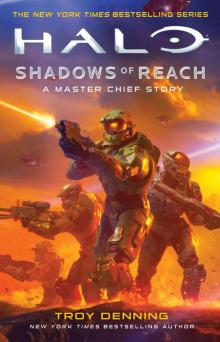 Shadows of Reach: A Master Chief Story
Shadows of Reach: A Master Chief Story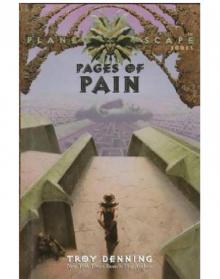 Pages of Pain p-1
Pages of Pain p-1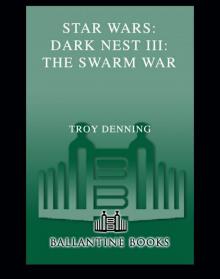 Star Wars 396 - The Dark Nest Trilogy III - The Swarm War
Star Wars 396 - The Dark Nest Trilogy III - The Swarm War Star Wars: Fate of the Jedi: Apocalypse
Star Wars: Fate of the Jedi: Apocalypse A Forest Apart
A Forest Apart Star Wars: Dark Nest II: The Unseen Queen
Star Wars: Dark Nest II: The Unseen Queen Star Wars: A Forest Apart
Star Wars: A Forest Apart Tempest: Star Wars (Legacy of the Force) (Star Wars: Legacy of the Force)
Tempest: Star Wars (Legacy of the Force) (Star Wars: Legacy of the Force) Star by Star
Star by Star Crucible: Star Wars
Crucible: Star Wars Last Light
Last Light Invincible
Invincible Inferno
Inferno Star Wars - The Trouble With Squibs
Star Wars - The Trouble With Squibs Abyss
Abyss The Verdent Passage
The Verdent Passage Vortex: Star Wars (Fate of the Jedi) (Star Wars: Fate of the Jedi)
Vortex: Star Wars (Fate of the Jedi) (Star Wars: Fate of the Jedi)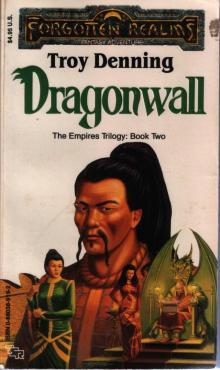 Dragonwall e-2
Dragonwall e-2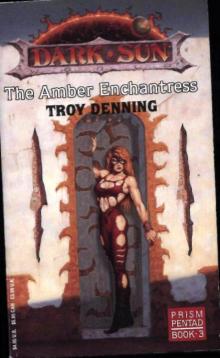 The Amber Enchantress
The Amber Enchantress Crucible
Crucible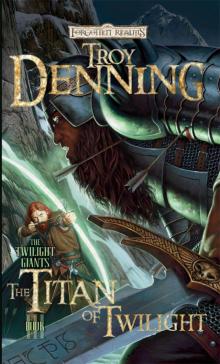 The Titan of Twilight
The Titan of Twilight Dragonwall
Dragonwall Beyond the High Road c-2
Beyond the High Road c-2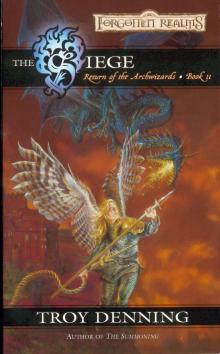 The Siege rota-2
The Siege rota-2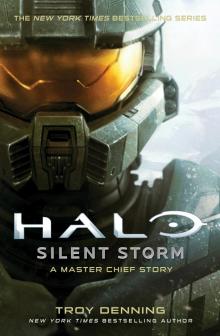 Silent Storm: A Master Chief Story
Silent Storm: A Master Chief Story The Ogre's Pact
The Ogre's Pact The Sorcerer rota-3
The Sorcerer rota-3 The Parched sea h-1
The Parched sea h-1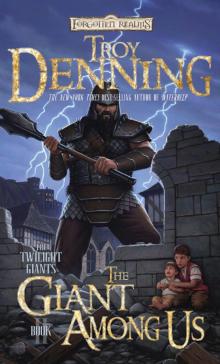 The Giant Among Us
The Giant Among Us Recovery
Recovery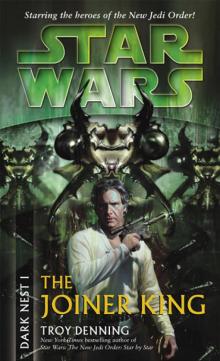 Star Wars: Dark Nest 1: The Joiner King
Star Wars: Dark Nest 1: The Joiner King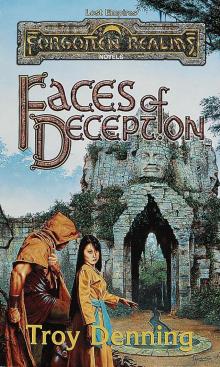 Faces of Deception le-2
Faces of Deception le-2 The Parched Sea
The Parched Sea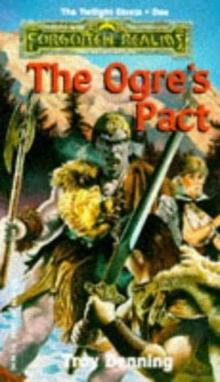 The Ogre's Pact зк-1
The Ogre's Pact зк-1 Apocalypse
Apocalypse Star Wars®: Dark Nest I: The Joiner King
Star Wars®: Dark Nest I: The Joiner King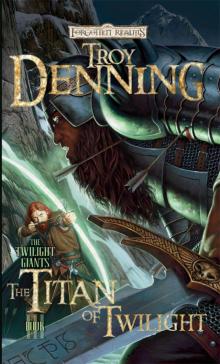 The Titan of Twilight ttg-3
The Titan of Twilight ttg-3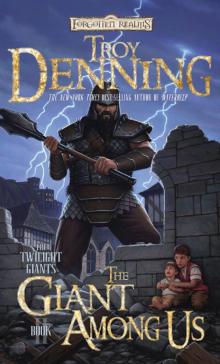 The Giant Among Us ttg-2
The Giant Among Us ttg-2 The Summoning rota-1
The Summoning rota-1 Tatooine Ghost
Tatooine Ghost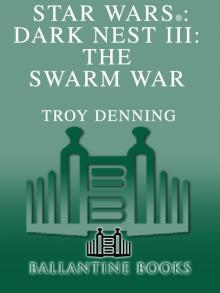 Star Wars®: Dark Nest III: The Swarm War
Star Wars®: Dark Nest III: The Swarm War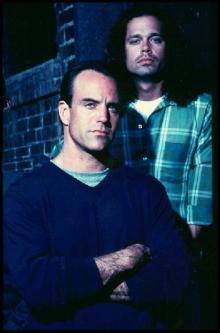 Retribution
Retribution A Forest Apart: Star Wars (Short Story)
A Forest Apart: Star Wars (Short Story) Faces of Deception
Faces of Deception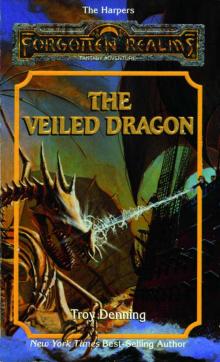 The Veiled Dragon h-12
The Veiled Dragon h-12 Star Wars 390 - The Dark Nest Trilogy I - The Joiner King
Star Wars 390 - The Dark Nest Trilogy I - The Joiner King Waterdeep
Waterdeep STAR WARS: NEW JEDI ORDER: RECOVERY
STAR WARS: NEW JEDI ORDER: RECOVERY